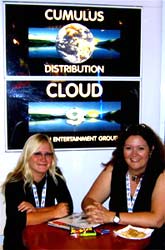 MIPTV
MIPTV
Have you ever wondered what it means when we say the Sales Team will be heading to MIP? What is MIP? Where is this mystical place?
Well even if you haven’t wondered, the area of Sales and the mysticism of MIP is still an interesting part of what goes on in the company and shows that we don’t just sit around twiddling our thumbs when we’re not in production!
Sales in a Nutshell
There are thousands of television production houses all over the world. Each one makes it’s own shows. Some are from formats that are sold to companies and made ‘local’ – like the Idol programs, DIY Rescue shows and Big Brother.
Other programmes are made that reflect the culture and beliefs of the individual country and these programmes would never really be popular anywhere else because foreign viewers just wouldn’t have a clue what was going on!
Programmes are made in a variety of genres. Animation, live action, drama, comedy, sci-fi, reality, documentary and interactive are just some of the genres that are popular and each country has its own particular favourite genre.
Production houses make their programme for a particular audience demographic. Some shows are aimed at a family audience and others aimed at pre-school for example.
Production houses want to see their programmes on air all around the world if possible. This brings in revenue that goes towards making more programmes. It also raises the profile of the company and helps to get new programmes made. And it is a chance for creative people who believe in their programmes to see fans in many countries become immersed in a show that the creative team feel is fantastic.
Hey, we all have egos and we all want other people to admire what we have done. And also to share something we feel is worth sharing.
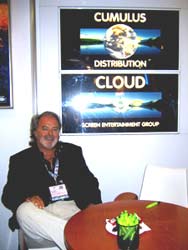 It’s like if you read a good book and it touched your life; you’d want to share it with someone else. That’s kind of what TV sales is like. It’s not just for the money (though that obviously helps get more things made) but it is to share something you believe in with the rest of the world.So, many companies have a distribution arm. That is, a company attached to the production company that is responsible for selling the programme (also known as product or title) to other countries (known as territories).
It’s like if you read a good book and it touched your life; you’d want to share it with someone else. That’s kind of what TV sales is like. It’s not just for the money (though that obviously helps get more things made) but it is to share something you believe in with the rest of the world.So, many companies have a distribution arm. That is, a company attached to the production company that is responsible for selling the programme (also known as product or title) to other countries (known as territories).
Confused yet? Read on…
Each territory has several broadcasters (like TVNZ, TV3&TV4, Prime and Maori TV in New Zealand or the BBC, BBC2, ITV, Channel 4, FIVE, etc. in the UK) that air programmes.
Each broadcaster has it’s Acquisitions (buying) team that go out and look for and buy programmes that suit the channel.
Territories also have agents or distributors that have good contacts in their territory and can sell your product in their country for you, which saves getting involved with too many broadcasters yourself in countries where the language barrier is difficult.
Festivals
There are several TV festivals that run around the world and sales teams, producers and buyers (from the broadcasters and agencies) attend these festivals.
The festivals are a great place for people in the industry to see what the market wants – in simple terms, what broadcasters want to show on TV.
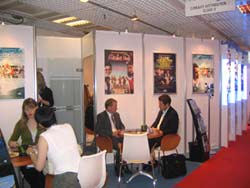 It is also a good opportunity to showcase what your team has on offer. There might be some new titles that your production house is working on. Or maybe you want to get into book publishing and merchandising of some characters from your product.
It is also a good opportunity to showcase what your team has on offer. There might be some new titles that your production house is working on. Or maybe you want to get into book publishing and merchandising of some characters from your product.
As there are so many buyers and sellers at a festival it is a very busy place to be. So many people to meet and so much to look at!
Some of the festivals include MIPTV, MIPDOC, MICOM, MIPCOM JUNIOR, NATPE and the ASIA TV FORUM to name but a few.
Cumulus is not just a cloud!
The Cumulus Distribution Team is the Sales Team that sells programmes made by Cloud 9.
The Sales Team is made up of people that specialise in selling programmes and is led by the Director of Sales, the lovely Jayne Pitts.
She has a team of sales executives who are each responsible for a territory – it might be Asia, Australia and New Zealand, the Middle East and Eastern Europe or North America, Africa and Scandinavia.
Each sales executive makes sure that they know who their contacts (also known as clients) are in each of their countries and develops a good business relationship with them, getting a feel for what they are looking for and when they want to screen product.
Some clients do not screen programmes for particular audiences. A wildlife channel for example would not be interested in airing a programme about army tanks. So it is important that the sales executive knows the market and doesn’t try to sell the wrong product to the wrong client or it could all be more than embarrassing.
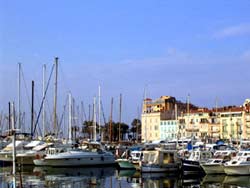 MIPTV 2004
MIPTV 2004
The Cumulus Team headed down to the South of France in March of this year to attend the MIPTV festival.
MIPTV is held in Cannes, which lies on the sunny south coast of France. Cannes is a beautiful town set around a marina full of exquisite and expensive yachts and is the playground of the rich and famous, many of whom attend the world famous annual Cannes Film Festival.
There is a large convention centre in the town and that is where attendees head to set up their stands and check out what’s going on.
A couple of days before the market kicks off, groups of people from companies that will be in attendance get to work on setting up their stands.
A stand is an area where people meet. Stands come in all shapes and sizes. Some of the bigger corporations have huge stands that are set up like offices complete with a receptionist and sometimes even a café!
Some stands are pretty wacky and reflect what product the team are selling – maybe a show about a desert island or dinosaurs for example.
Hundreds and hundreds of stands are fitted into the convention centre, which has several floors.
Flyers, freebees and posters are set out and the stand is complete.
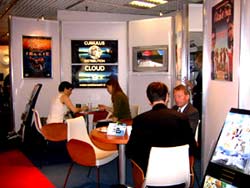 Bring it on!
Bring it on!
And then they arrive. People from all over the world. Buyers, sellers, producers, journalists, cast members. All descend in Cannes for 4 days of meetings and meetings and yet more meetings.
Attendees arrive each day at the convention centre at around 8am after having had breakfast meetings at their hotels.
Sales Teams head to their stands and get ready for their meetings of the day. Each meeting lasts for around half an hour and is immediately followed by another meeting. Sometimes sales executives go to another stand for their meeting and sometimes they even manage to escape outside for a meeting in a local café or literally just outside the convention centre doors to get a breath of fresh air and some daylight!
Meetings are made up of talking about what the buyer wants and what the demographic target audience is. Some buyers have already bought previous programmes and want to talk about purchasing the next series or look at buying another series and some are interested in a particular new title that is in development.
Buyers become old friends after a couple of festivals and it is always a pleasure to catch up with familiar faces again.
After a busy day of meetings it is time to head back to your hotel at around 7pm to change for…a dinner meeting!! Days usually end at midnight at the earliest and by the end of the festival attendees look exhausted!
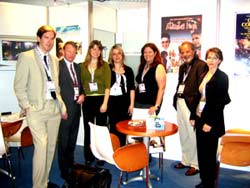 Follow-ups
Follow-ups
After a market finishes everyone jumps on planes and head home to catch up on sleep – hard if you have jetlag too!
And the Sales Team work hard at emailing people they have met to continue progress on selling some product, send out screening cassettes of product to give the client a better idea of what the product is about and arranging meetings in the client’s home country to continue building a business relationship and get product on screen.
Phew!
So, the life of the sales team is a busy one and they literally eat, sleep and breathe the programmes that you love to watch.
The work doesn’t stop once a programme has been sold to a broadcaster. Contracts have to be drawn up and the right materials (tapes and scripts) have to be sent out. The team try to get broadcasters to air the programme at a good time and also get involved in the Tribe tours, working with broadcasters to ensure that cast get to meet fans and appear on local TV shows.
The rest of the team here at Cloud 9 work alongside the Sales Team to ensure that they get the correct information about a programme, help design flyers and posters for festivals, send out tapes and merchandise quickly and check that all is generally well.
Glamour?
Photocopying hundreds of scripts, sending out packages to broadcasters and emailing thousands of contacts is not all glamorous and it is hard work but it is worth it.
All the team both at Cumulus Distribution and Cloud 9 enjoy bringing programmes that we really believe in to your TV screens.
Enjoy!
Glossary
Acquisition – buying something, acquiring it really.
Airs – shows the programme on the TV
Broadcaster – channel that shows the programme
Buyer – as above
Client – person you deal with
Demographic – you guys and whatever category you fall into – pre-school, family, 30-somethings, etc.
Flyers – handouts advertising the programmes
Flying – getting on a plane or flapping your wings (sorry, lame joke!)
Materials – tapes, flyers, scripts and slides a broadcaster needs to show the programme
Product – the actual TV series
Produces – makes
Production House – a company like Cloud 9 who produces its own programmes
Territory – area of the world, country
Screens – shows the programme on the TV
Target Group – the age group that the programme makers aim their programme at

